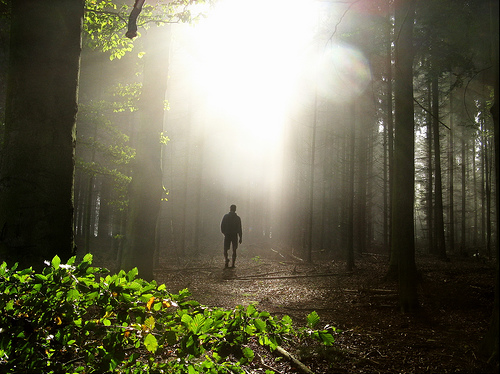Meditations on Psalm 23 & 1 John 1:7 – Walking in the light
Blessing the Way — Jan Richardson
With every step
you take
this blessing rises up
to meet you.
It has been waiting
long ages for you.
Look close
and you can see
the layers of it,
how it has been fashioned
by those who walked
this road before you
how it has been created
of nothing but
their determination
and their dreaming,
how it has taken
its form
from an ancient hope
that drew them forward
and made a way for them
when no way could be
seen.
Look closer
and you will see
this blessing
is not finished,
that you are part
of the path
it is preparing
that you are how
this blessing means
to be a voice
within the wilderness
and a welcome
for the way.
(Rev Gail’s note: Used as this week’s call to worship)
Meditations on Psalm 23
“… prompted by 9/11 … in the wake of the attack, everybody from my next-door neighbor to Tom Brokaw was asking me, How could God let this happen? The answer I found myself giving was that God’s promise was never that life would be fair. God’s promise was that when we have to confront the unfairness of life, we will be able to handle it because we won’t do it alone–He’ll be with us. After I’d said that a couple of times, I realized that’s the 23rd Psalm. “I will fear no evil for thou art with me.”
Sometimes people lose faith. But sometimes people lose faith in a certain childish conception of God and acquire a more mature conception of God. Paul Tillich once said, “When I was 17 I believed in God. Now that I’m 70 I still believe in God, but not the same God.” A naïve conception of God is a God who is always there to protect us. We replace it with a more realistic understanding of a God who is there to help us through the difficult times in our lives.
— Rabbi Harold Kushner, from interview on Beliefnet
As a kid, I was taught that if you opened the Bible in the middle you’d probably land on the book of Psalms. And near the middle is everyone’s favorite, the 23rd, there is this line: “You prepare a table before in the presence of my enemies.” I don’t know how many times I’ve read or recited this Psalm without pondering what that line actually means, but here is my take on it. When things are a bit tense, when life is not going at its best, when the potential for disaster is just around the corner, when your enemies are all around you – and even staring you down! – that’s when God lays out the red-checkered picnic cloth and says, “Oooo, this is a nice place. Let’s hang out here together for a while…just you and me.” ― David Brazzeal, Pray Like a Gourmet: Creative Ways to Feed Your Soul
I was silently reciting to myself the 23rd Psalm, ‘The Lord is my shepherd; I shall not want …’ The man with the tinted spectacles and the man from the police department were looking at me thoughtfully. They mistook my silence as a sign of weakening. I knew I had to show courage. In fact, I felt much better for having recited the words of the psalm. I had not been so free of fear the whole evening as I was in that moment standing beside the black jeep, a symbol of repression. I lifted my head and said in a loud and firm voice, ‘I’m not guilty! I have nothing to confess.’ ― Nien Cheng, Life and Death in Shanghai
The other names sound somewhat too gloriously and majestically, and bring, as it were, an awe and fear with them, when we hear them uttered. This is the case when the Scriptures call God our Lord, King, Creator. This however, is not the case with the sweet word shepherd. It brings to the godly, when they read it or bear it, as it were a confidence, a consolation, or security like the word father. — Martin Luther, Catholic priest and reformer
It is little wonder the passage has such broad appeal. It is one of the most personal of all Scripture texts … Yet it is all about what a gracious and benevolent shepherd God is, with seemingly no expectation of our offering anything in return.
It is about pure grace.
That’s certainly a message we all need, given how impoverished and dependent we human beings are, and how we much need divine nurture and care, especially in times of loss, loneliness and distress.
But it’s not intended to give us the whole picture of our covenant with God. The other side of the story, found in multitudes of other passages, is about how God calls us and equips us to learn shepherding and nurturing ourselves, and to graciously pass on that love and care to others in need.
It’s that second calling that is so easily and so often overlooked. To a repentant Peter, Jesus’s message is that if you really love me, you will shepherd my sheep, feed my lambs, lead others to places of nourishment and growth (e.g., to “feed” them).
In other words, we are called to be both aware of our spiritual poverty, to be receivers of grace, and to be a means by which we convey grace and help to others. God’s shalom is always to be passed on … In other words, having been blessed by Psalm 23-style shepherding, we practice that same kind of shepherding toward others. — Rev Harvey Yoder, excerpt from Mennonite blog posting.

Meditations on Light:
The Properties of Light — Eric Gamalinda (excerpt)
… one of the elms
has changed early, burning with a light
grown accustomed to its own magnificence,
imperceptible until this moment when it becomes
more than itself, more than a ritual
of self-immolation. I think of sacrifice
as nourishment, the light feeding bark and veins
and blood and skin, the tree better off
for wanting nothing more. I used to imagine
the chakra like this—a hole in the soul
from the top of the head, where the light of knowing
can shimmer through. In the summer of 1979
I saw that light shoot from my brother’s forehead
as we sat chanting in a temple in Manila.
He didn’t see it pulsing like a bulb in a storm,
but he said he felt the warmth that wasn’t warmth
but peace. And I, who have never been
so privileged, since then have wondered
if we believed everything because not to believe
was to be unhappy. I’ve seen that light elsewhere
—on a river in Bangkok, or pixeled across
the shattered façades of Prague—but it is here
where I perceive its keenest rarity, where I know
it has passed over all the world, has given shape
to cities, cast glamour over the eyes of the skeptic,
so that it comes to me informed with the wonder
of many beings. I can’t begin to say how infinite I feel,
as though I were one of many a weightless absence
touches, and out of this a strange transformation:
the soul ringed with changes, as old as a tree,
as old as light. I am always learning the same thing:
there is no other way to live than this,
still, and grateful, and full of longing.
Let the Light Enter
— Frances Ellen Watkins Harper
“The Dying Words of Goethe”
“Light! more light! the shadows deepen,
And my life is ebbing low,
Throw the windows widely open:
Light! more light! before I go.
“Softly let the balmy sunshine
Play around my dying bed,
E’er the dimly lighted valley
I with lonely feet must tread.
“Light! more light! for Death is weaving
Shadows ‘round my waning sight,
And I fain would gaze upon him
Through a stream of earthly light.”
Not for greater gifts of genius;
Not for thoughts more grandly bright,
All the dying poet whispers
Is a prayer for light, more light.
Heeds he not the gathered laurels,
Fading slowly from his sight;
All the poet’s aspirations
Centre in that prayer for light.
Gracious Saviour, when life’s day-dreams
Melt and vanish from the sight,
May our dim and longing vision
Then be blessed with light, more light.
